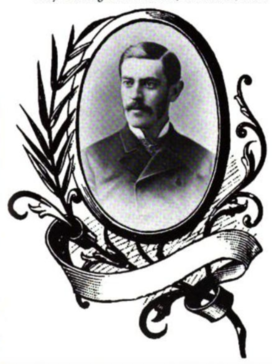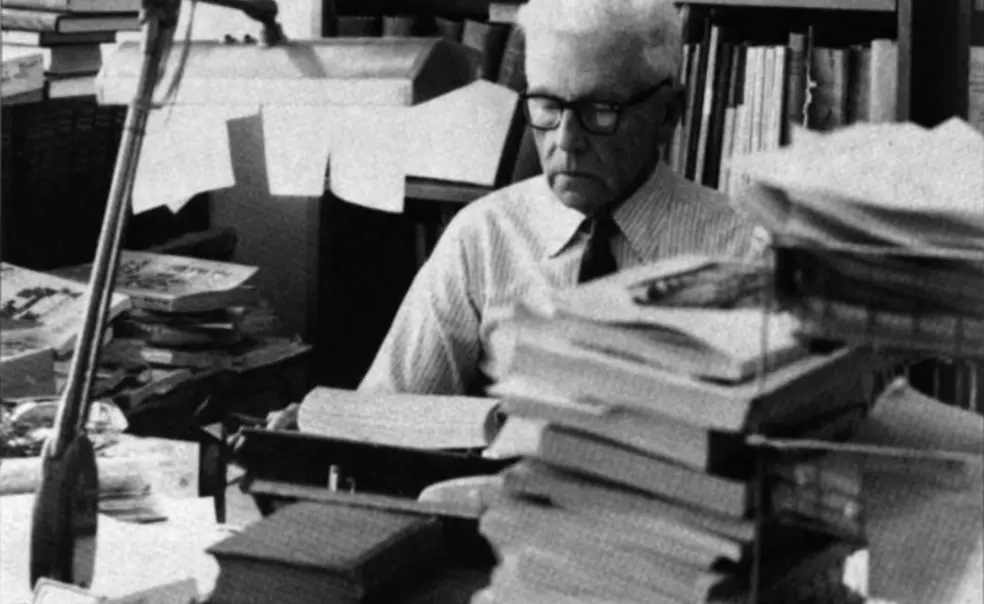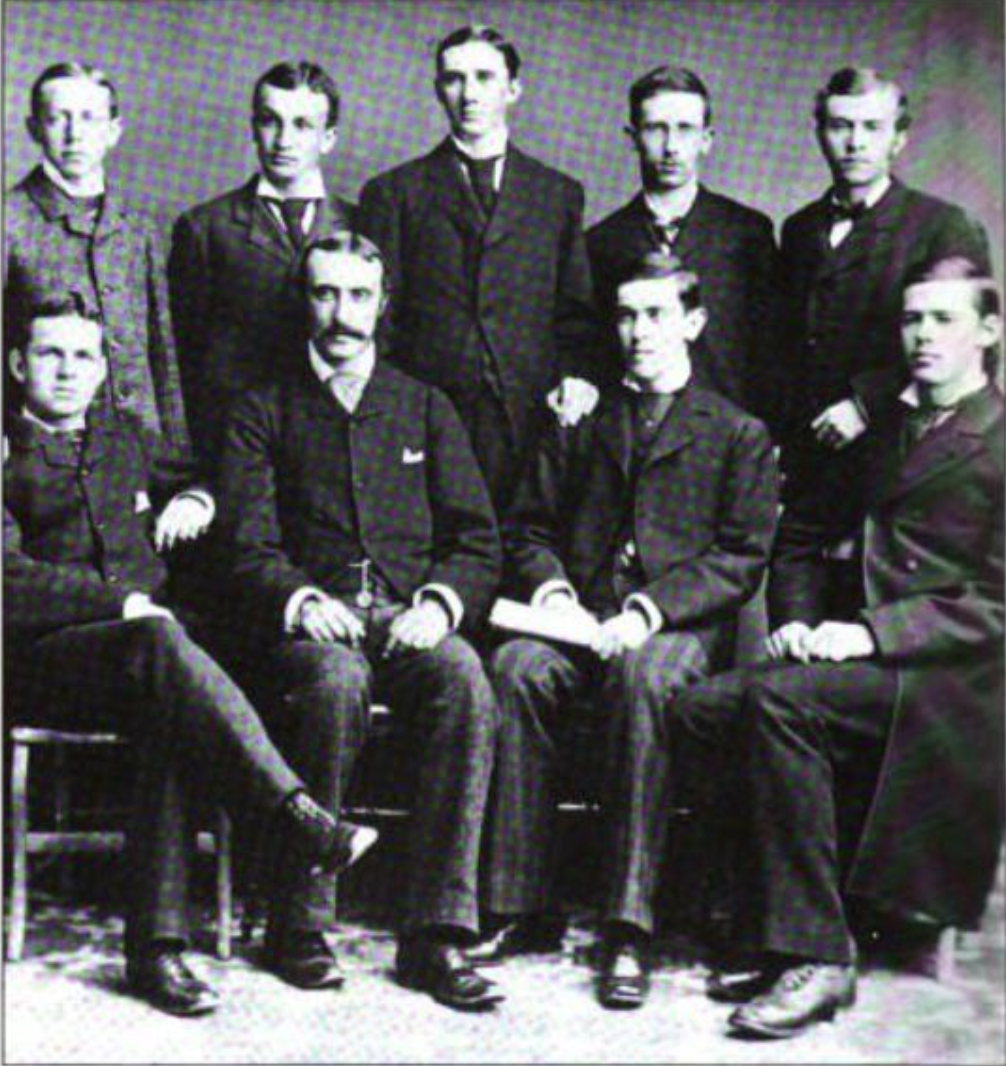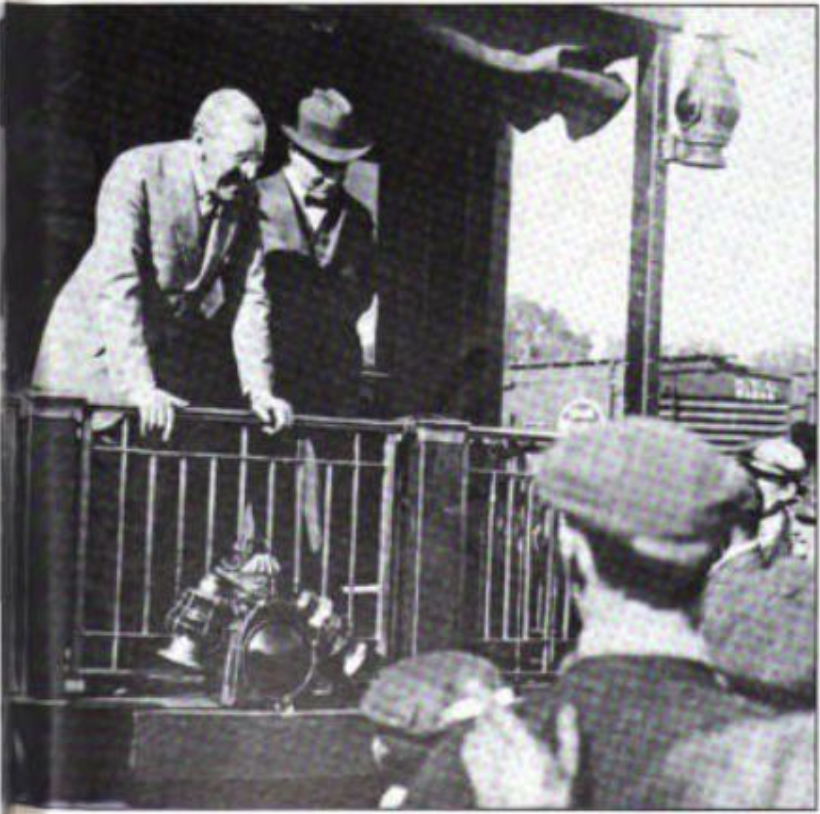Arthur S. Link Finally Finished With Woodrow Wilson ’79 After 35 Years
Terry Teachout is arts columnist of The New York Daily News. He is writing H. L. Mencken: A Life and editing A Second Mencken Chrestomathy. This story appeared in The New York Times Book Review last October 31st and is reprinted by permission. Copyright © 1993 by The New York Times Company.
On March 4, 1913, Woodrow Wilson was sworn in as President of the United States. Eighty years later to the month, Princeton University Press published the final narrative installment of The Papers of Woodrow Wilson, a documentary record of Wilson’s life and work that fills sixty-nine volumes. Now, a year later, the press is about to release the last book in the series, an index covering volumes fifty-three to sixty-eight. None of these elegant-looking books (each one of which costs sixty-five dollars) has ever appeared on a best-seller list; none is likely to turn up on the shelves of your neighborhood bookstore any time soon. Yet some ninety-five thousand individual volumes have been sold since 1966, when the first one appeared. Virtually every American library owns a set, as do hundreds of other libraries around the world (there are at least two sets in Moscow). Initially subsidized by the Woodrow Wilson Foundation, The Papers of Woodrow Wilson long ago began to turn a handsome profit for the press. In fact, the publication of the Wilson papers is probably the biggest success story to date in the little-known branch of historical research known as documentary editing.
The publication of large-scale documentary editions like The Papers of Woodrow Wilson, which make essential primary sources readily accessible to historians everywhere, is one of the most important jobs done by America’s university presses, and one of the most unglamorous. Documentary editing projects, like dissertations, have a way of dragging on forever; many actually outlive their original editors.
The National Historical Publications and Records Commission, a federal agency affiliated with the National Archives, is supplying financial assistance to forty-five such projects, including editions of the papers of George Washington, John Adams, Thomas Jefferson, James Madison, Andrew Jackson, Ulysses S. Grant, and Dwight D. Eisenhower. Few of these projects are anywhere near completion. Princeton University Press, for example, published the first volume of The Papers of Thomas Jefferson in 1950 and the twenty-fifth in 1992; forty-two more volumes are planned (see “Reading Jefferson’s Mail,” PAW, November 10, 1993).
That the publication of Woodrow Wilson’s papers was completed within a thirty-five-year span is thus remarkable enough. That one man, Arthur S. Link, edited all sixty-nine volumes is scarcely believable. (The Jefferson papers have had three chief editors so far.) The project, as Link freely admits, was by no means a one-man show. But even though he worked closely with a small group of devoted assistants, Arthur Link’s own contribution throughout those thirty-five years was crucial. Working without benefit of modern word-processing technology, he personally chose every document, wrote most of the longer footnotes, and saw each volume through the press; he also carried a full teaching load a Princeton, published two dozen books of his own, underwent seven back operations, and helped raise four children.The project’s associate editor, John E. Little *66, who joined Link’s staff in 1961 and stayed for thirty-one years, has called him “the living embodiment of the Protestant work ethic…To know him at all was to realize from the outset that the Wilson project would indeed be completed within his working lifetime. It simply had to be, it would be, and that was all there was to it.”
Arthur Link, who retired recently to North Carolina, is dapper and compact, with white, swept-back hair and a finely lined face. His soft baritone voice is tinged with the sweet cadences of Virginia, where he was born in 1920, just four years before the death of another distinguished Virginian, Woodrow Wilson. Despite a childhood case of polio and a lifelong history of back trouble (“I have Presbyterian disease – too much backbone”), Link can scuttle up and down the sidewalks of Princeton with exhausting efficiency, cheerfully pointing out landmarks with his cane.
A born enthusiast, Link loves to talk about the music of Wagner and the novels of Trollope (he calls The Last Chronicle of Barset “the greatest novel in the English language”). He brings the same infectious enthusiasm to his scholarly work: “You ought to do what you want to do. The worst thing to do would be to get involved with a person or subject or school that you don’t find congenial. Most of the Hitler and Stalin scholars I know are depressed people. I suppose that kind of thing has to be done, but I don’t want to do it. I want to have fun.”
Ironically, the young Arthur Link had little use for Woodrow Wilson. “I grew up in adolescence,” he recalls, “on what is now known as ‘revisionism.’ We all thought the Germans got a raw deal at Versailles, and everybody was debunking Wilson at the time, so I didn’t come to him with a great deal of admiration. In fact, I didn’t like him at all. But in 1941, I took a course in recent American history from a teacher who was a great admirer of Wilson. He got me terribly excited about Wilson, and I read all there was to read about him, of which there wasn’t a great deal. We had the eight-volume Ray Stannard Baker biography [Woodrow Wilson: Life and Letters], but Baker was such a prude. He neutered Wilson – took the life force away from him. And outside of Baker and a couple of contemporary biographies, you could have put all the Wilson books available at that time on one shelf.”
Link added the first of his own twelve books tot hat shelf in 1947. “I was fascinated by Wilson’s rise to the governorship of New Jersey and his campaign for and election to the presidency,” he recalls, “and what I originally intended to do was write a book called ‘The Political Education of Woodrow Wilson.’ That grew into the first volume of my Wilson biography, Wilson: The Road to the White House.”
Link’s timing was perfect. Interest in Woodrow Wilson’s multilateral approach to foreign policy was growing in the wake of the founding of the United Nations, and the Library of Congress’s collection of Wilson papers had recently been opened to scholars: “Soon it was clear to me that there was a very large body of Wilson materials that had never been published, or had only been published in corrupt editions. By that time, I was pretty well hooked on Wilson – but I also realized that I had discovered a scholarly gold mine.”
In 1949, Link began teaching history at Northwestern University, where he wrote the second volume of his biography, Wilson: The New Freedom (1956), which received the Bancroft Prize. Once again, his timing was impeccable. In 1957, a year after the Wilson centenary, the New York-based Woodrow Wilson Foundation, organized in 1922 by a group of Wilson’s admirers, decided to devote its entire financial resources to the collection and publication of Wilson’s papers in cooperation with Princeton University.
The foundation invited Link to become director of the project in 1958. “To be frank,” he says, “the field wasn’t all that wide. There were only three or four people considered, and I was the only one who had already done a lot of work with the papers.” He accepted the offer, leaving Northwestern to join the Princeton faculty as a professor of history and chief editor of the Wilson papers.
At that time, and for many years to come, Link expected to return to his Wilson biography once the papers were finished: “I really didn’t know how long the job would take – I had no idea. I was thirty-eight at the time, and I thought it would take about twenty years, but that was a sheer guess.” In fact, he would complete three volumes out of a projected eight, the last one appearing in 1965 (all were published by Princeton University Press). But he soon found himself spending more and more time on the Wilson papers, which posed daunting editorial problems.
One typical example: Wilson drafted many of his letters, speeches, and articles in Graham shorthand, a system that had become obsolete long before Link and his staff began preparing the Wilson papers for publication. In order to decipher this material, one of Link’s assistants tracked down Clifford P. Gehman, a Graham expert born in 1975 (the same year Wilson matriculated at Princeton), and hired him to transcribe Wilson’s shorthand manuscripts.
Merely assembling Wilson’s papers proved difficult enough. The Library of Congress’s collection consisted mainly of official state papers, most of which had previously appeared in the six-volume Public Papers of Woodrow Wilson, edited by Ray Stannard Baker and William E. Dodd and published between 1925 and 1927. Other important manuscript materials, among them a cache of nineteen thousand documents unexpectedly discovered in 1963 in Wilson’s old S Street home in Washington, had to be hunted down, photocopied, and sent to Princeton. (The editorial team never worked directly with original documents.) In addition, much of Wilson’s’ correspondence was still uncollected in 1958; Wilson kept no copies of his personal letters, and relatively few copies of the thousands of official letters he wrote by hand and on his own Hammond typewriter. “By 1964,” Link says, “we had collected only about 65 percent of the papers we had at the end.”
Link further complicated his task by devising what was then a radically new style of historical editing: “The old practice – as seen in, say, the bicentennial edition of the George Washington papers – was to go to the Library of Congress, take Washington’s official papers, and print them, and nothing else. Some people urged me to do this sort of thing, but I said it wouldn’t do, particularly with Wilson. We said we would publish all documents that had an important impact on Wilson’s thought.
“Now, what is a Wilson document? Obviously, anything Wilson himself generated. But I also decided to include all important incoming materials – all the memoranda letters, and reports that Wilson read, that had an impact on him and helped shape his policies. Either you print those documents or you summarize them in long footnotes, and we decided that they deserved to be published. Then, of course, we included speeches, and I also made very extensive use of what are known as third-party records: for example, diary entries reporting conversations with Wilson, which are tremendously important but were not normally included in editions of this kind.”

Primitive technology notwithstanding, the fruits of Arthur Link’s Luddite labors turned out to be amazingly readable. Indeed, some volumes of The Papers of Woodrow Wilson have a narrative sweep approaching that of a good epistolary novel. It helped, of course, that Link and his staff annotated each document with scrupulous care: “Annotation ought to put a document in its proper context so that even a high-school student can read it and, with the notes, understand it.”
From the outset, the Link approach to documentary editing was widely praised, and quickly became influential; today, virtually all major documentary projects are being edited (and the George Washington papers reedited) along the lines of the Wilson papers.
Link’s new job eventually forced him to make a hard choice. Though he has continued to publish monographs on various aspects of Woodrow Wilson’s life (including a brief life of Wilson intended for students), his Wilson biography remains, and will remain, a torso: “I knew from the mid-seventies on that I wouldn’t have time to finish it. At seventy-three, I simply don’t have the physical energy to go around the world hunting down facts about Wilson, and I don’t want to be separated from my wife, Margaret. What we’ve done with the Wilson papers will have to be my contribution.”
Yet he has no regrets whatsoever about abandoning the biography. “I know it sounds awfully boastful,” he says, “but I really do think our edition of the papers will be used as long as people know the English language. We’ve provided the basis for good, solid work, not just on future Wilson biographies but on virtually every aspect of a most important period in the twentieth century. Good gracious, what more can a person ask?”
In retrospect, Link realizes that editing the Wilson papers could easily have done worse things than simply cause him to leave his biography unfinished. “If I had done nothing else but edit the papers, I think I would have been a very frustrated man,” he says. “If you’re in a university department, you’re either in it or not in it. What I feared most was isolation from my colleagues.” He steered clear of that fate by immersing himself in the daily routine of Princeton’s history department (his past students include George McGovern at Northwestern and Bill Bradley ’65 at Princeton), sitting on faculty committees, and playing an active role in professional organizations (like Wilson, he served a term as president of the American Historical Association). “I was young, and I had a lot of energy – we Links are very energetic people – and I could work ten or twelve hours a day, always six days a week, and usually Sunday afternoons,” he says matter-of-factly of a workload that would have left most men gasping.
“I know it sounds strange,” one colleague speculates, “but I think his poor health must have had something to do with his productivity. I think he used work to take his mind off the pain. If he hadn’t had all those back operations, he might not have finished editing the papers.”
Link retired from his chair as the George Henry Davis ’86 Professor of American History in 1991 and completed editorial work on the Wilson papers the following year. He felt oddly disoriented for a short time: “It was like laying railroad ties between New York and San Francisco. For all those years, I never had to worry about having something to do – and then I was finished!”Now he has started work on a new book about the relationship between Woodrow Wilson and Cary Grayson, the White House doctor who kept Wilson alive after his stroke in October 1919. “I got terribly interested in neurological science on account of Wilson’s medical history,” he explains, “and I’m now, of all things, giving lectures in the history of medicine. Right now, I’m editing a long piece on the first fifty years of American neurology, and learning a lot. I wanted to do something new.”
Arthur Link’s choice of career will doubtless mystify those whose mental picture of the twenty-eighth President of the United States derives largely from the savage caricatures of such well-known Wilson-baiters as John Maynard Keynes and H. L. Mencken (“Wilson was a typical Puritan – of the better sort, perhaps, for he at least toyed with the ambition to appear as a gentleman, but nevertheless a pure Puritan”). For Link, there’s nothing at all mysterious about it. In his case, familiarity with the life of Woodrow Wilson has bred not contempt but extravagant admiration.
“I fancy myself an intellectual,” he says, “but I have never encountered anyone in history with such a mind as Wilson. That mind of his was always challenging me – to stretch my mind to meet his. I’ve read a lot of history in my life, and I think that aside from St. Paul, Jesus, and the great religious prophets, Woodrow Wilson was the most admirable character I’ve ever encountered in history, and the most wonderful person. A man of complete integrity.”
Comparing Woodrow Wilson to Jesus Christ is likely to raise eyebrows, not to mention hackles, in academic circles, but such juxtapositions come naturally to Link, a minister’s son who remains, like Wilson, a devout and unabashed Presbyterian. In his epilogue to the final volume of the Wilson papers, he thanks his colleagues, his wife, and “Him who gave me the strength for labors through the years.”
Asked if he feels destiny may have played a part in his having been chosen to edit the Wilson papers, he answers unhesitatingly: “I believe God created me to do this, and it’s just as simple as that. Not many people in this day and age would think there was such a thing as a divine call, but I do, and I had it.” Looking at the sixty-nine volumes of The Papers of Woodrow Wilson, still the only comprehensive set of presidential papers to have been published in its entirety, even the most chronic of scoffers is likely to wonder if Arthur Link might just be on to something.
This was originally published in the April 6, 1994 issue of PAW.














No responses yet